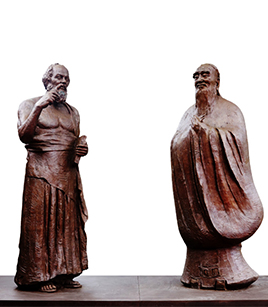When ancient Greeks ‘met with’ Chinese

FILE PHOTO: “Confucius and Socrates: An Encounter,” a pair of bronze statues created by Wu Weishan
In a signed article by President Xi Jinping titled “Let Wisdom of Ancient Civilizations Shine Through the Future,” Xi wrote: “Great civilizations have much in common to offer each other. More than 2,000 years ago, ancient Chinese and Greek civilizations shone brightly in Asia and Europe. Greek’s golden era produced many of its great philosophers and literary giants. That coincided with a period in China when ‘a hundred schools of thought contended with each other’ and flourished together.”
Socrates and Confucius are respectively two of the most prestigious representatives in the history of ancient Western and Eastern philosophy. Both philosophers ascribed great affection to “knowledge.” As Socrates famously said: “The only true wisdom is in knowing you know nothing.” This resonates with and mirrors the Confucian teaching “When you know a thing, to hold that you know it; and when you do not know a thing, to allow that you do not know it—this is knowledge” (trans. James Legge).
There is also similarity between the lifestyles and philosophies of Diogenes, one of the founders of Cynicism, and Zhuangzi, a leading Daoist philosopher who lived around the 4th century BCE in China. They both advocated simple, natural lifestyles. It is recorded that “Zhuangzi, in a patched dress of coarse cloth, and having his shoes tied together with strings, was passing by the king of Wei, who said to him, ‘How great, Master, is your distress?’ Zhuangzi replied, ‘It is poverty, not distress! While a scholar possesses the Dao and its Attributes, he cannot be going about in distress. Tattered clothes and shoes tied on the feet are the sign of poverty, and not of distress. This is what we call not meeting with the right time’” (trans. James Legge). Diogenes also believed that nothing but the needs of nature must be satisfied. These two philosophers were unconcerned with the perceptions of others, preferring truthfulness with oneself in all circumstances.
Edited by REN GUANHONG

 PRINT
PRINT CLOSE
CLOSE